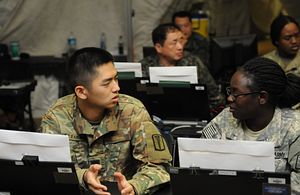On August 21, the United States and South Korea launched their annual joint military exercises, dubbed Ulchi-Freedom Guardian, amid increased tensions over the North Korea crisis. A Defense Ministry official told the Chosun Ilbo that this year’s drill will likely play “a nuclear war game for the first time.” Faced with the annual drills, China warned the U.S. and South Korea not to “add fuel to the fire.”
According to the U.S. Department of Defense, the computer-simulated defensive drills will last 11 days and involve some 17,500 American service members, including about 3,000 participating from installations outside South Korea.
Although both South Korean President Moon Jae-in and U.S. Defense Secretary Jim Mattis stressed on different occasions that the exercise is defensive in nature, not in response to North Korea’s latest behavior, Pyongyang saw the joint-exercise as an act of provocation anyway. North Korea’s KCNA news agency claimed: “this is aimed to ignite a nuclear war on the Korean peninsula at any cost.”
China’s foreign ministry spokeswoman Hua Chunying criticized the joint military drills, saying they “are not helpful to the de-escalation of the current tensions and the efforts made by all relevant parties to promote peace talks,” as the current situation on the Korean Peninsula is “highly complex, sensitive and delicate.” Hua said at the regular press conference on August 21:
What we are concerned about is whether the military exercises can help to build mutual trust between relevant parties and ease the current tensions on the Korean Peninsula. We hope all relevant parties can take more constructive actions that can help to ease the current tensions on the Korean Peninsula and properly resolve the Korean Peninsula nuclear issue through peace talks rather than add fuel to the fire.
With an eye toward Chinese interpretation of “constructive actions,” Hua once again urged all involved parties — the U.S. and South Korea in particular — to “take seriously and give positive consideration” to China’s proposal of “suspension for suspension.”
“Suspension for suspension,” or “dual suspensions,” was a proposal made by Beijing in March that Pyongyang declare a moratorium on both nuclear and missile tests in exchange for the United States and South Korea halting large-scale joint military exercises. The proposal is welcomed by North Korea, but rejected by the U.S. and South Korea.
That being said, Hua also noted that the “tense situation on the Korean Peninsula has shown a slight sign of abatement recently,” because of the concerted efforts of all relevant parties. What she was referring to specially might be U.S. Marine Corps General Joe Dunford’s visit to Asia, during which he met Chinese President Xi Jinping on August 17. Both sides promised to strengthen the military ties to resolve the North Korean issue.

































